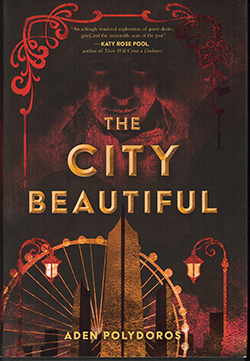The City Beautiful by Aden Polydoros; Toronto: Inkyard Press © 2021; ISBN 9781335-402509; 462 pages plus author’s note and glossary; $19.99.
By Donald H. Harrison

 SAN DIEGO – This novel for young adults is set in Chicago at the time of the 1893 World’s Fair, when immigration to America was prohibited for people with diseases, but otherwise was unrestrained by quotas. Maxwell Street at the time was a bustling, crowded, impoverished neighborhood for Jewish immigrants from Eastern Europe, one of whom – the protagonist Alter Rosen – has dreams of earning enough money as a linotype operator to pay for passage from Romania to America for his mother and two young sisters. He also has nightmares that people will learn that he is a homosexual.
SAN DIEGO – This novel for young adults is set in Chicago at the time of the 1893 World’s Fair, when immigration to America was prohibited for people with diseases, but otherwise was unrestrained by quotas. Maxwell Street at the time was a bustling, crowded, impoverished neighborhood for Jewish immigrants from Eastern Europe, one of whom – the protagonist Alter Rosen – has dreams of earning enough money as a linotype operator to pay for passage from Romania to America for his mother and two young sisters. He also has nightmares that people will learn that he is a homosexual.
The central plot of The City Beautiful is a rash of murders and disappearances of young Jewish men. The Chicago police don’t seem to care – with so many immigrants, what does it matter if there are a few less? – but Alter and his friends Feivel and Raizel, are determined to learn the truth, wherever it may lead.
Feivel, who has reinvented himself as Frankie, leads a ring of thieves who target wealthy Chicagoans, while respecting the sanctity of the lives of their fellow members of the underclass. Raizel, a neighbor in the apartment house where Alter shares a room with three other young men, is a revolutionary sympathetic to both Marxists and anarchists.
A victim of the mysterious killer or killers was Yakov, one of Alter’s roommates, upon whom he had a crush. Yakov’s soul would not depart this world easily, instead invading Alter’s body as a dybbuk, hoping to utilize his old roommate as an instrument of vengeance.
It takes 462 pages to resolve this plot; to my mind, at least 162 pages too many. Some of the scenes of Alter’s consciousness being altered into Yakov’s were repetitious, making me impatient for the author to get on with the rest of the story. Clearly, author Polydoros had done considerable research about dybbuks; the World’s Fair, where some of the action takes place; and the foul practices of the 19th century slaughterhouse industry for which Chicago was famous. “Hog butcher for the world,” wrote Carl Sandburg in his famous poem about the midwestern metropolis. However, Polydoros could have saved some of his research for another book, instead of over-burdening this one.
Nevertheless, the book is evocative of another era, and although possession by another person’s spirit is the stuff of fantasy, Polydoros’ descriptions of tenement life and exploitative working conditions may be valuable for the understanding of the present generation of young adults about what came before them.
*
Donald H. Harrison is editor of San Diego Jewish World. He may be contacted via donald.harrison@sdjewishworld.com